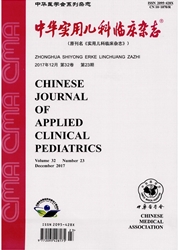

 中文摘要:
中文摘要:
为研究维生素D对基因组稳定性作用,观察维生素D对^60Co辐射损伤小鼠外周血象、骨髓嗜多染红细胞(Polychromatic erythrocytes,PCE)微核率和骨髓有核细胞(Bone marrow cells,BMC)细胞周期和凋亡的影响。使用^60Co辐射制备损伤模型,维生素D制剂(阿法骨化醇胶丸)灌胃,观察外周血象、PCE微核率(Giemsa法)的变化,并用流式细胞仪分析BMC细胞周期和凋亡情况。结果显示,小鼠辐射后外周血白细胞、血小板数显著下降,骨髓造血损伤,染色体损伤,而维生素D能在一定程度上促进外周血象的恢复,抑制微核率的发生。流式细胞仪分析表明,辐射后24h,维生素D干预组,BMC的G0/G1期细胞比例较辐射损伤组明显减少,G2期和S期细胞较辐照组增多。这说明维生素D可能成为一个新的辐射防护剂。
 英文摘要:
英文摘要:
To investigate the radioprotective effect of vitamin D against irradiation injury, the mice exposed to ^60Co γ-rays at 6 Gy was treated with preparation of vitamin D(Alfacalcidol Soft Capsules). Cell cycle and apoptosis was analyzed by flow cytometry (FCM) following staining of cells with propidium iodide (PI). Peripheral blood cell counts were analyzed by autoanalyzer. It has been found that vitamin D significantly increases white blood cell ( WBC ) counts, decreases bone marrow PEC micronucleus rate. FCM analysis shows that compared with damaged group,G2 and S phases of bone marrow cells in vitamin D protection group increases significantly at 24 h after whole body irradiation, whereas G1 phase cells decrease at the same times. So vitamin D might be a new radioprotection agent and it should be deserved further study.
 同期刊论文项目
同期刊论文项目
 同项目期刊论文
同项目期刊论文
 期刊信息
期刊信息
